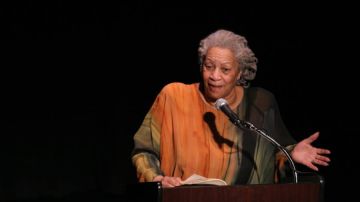11 Toni Morrison Quotes That’ll Empower and Inspire
Toni Morrison’s works were seminal in African-American literature but the overall impact she’s had on American literature is undeniable and irreplaceable

Photo: Wikimedia Commons/Angela Radulescu
Toni Morrison’s works were seminal in African-American literature but the overall impact she’s had on American literature is undeniable and irreplaceable. Morrison, who was 88 years old, died in 2019 of complications from pneumonia, but her legacy and impact live on.
Morrison was the first African-American woman to win the Nobel Prize in Literature in 1993 and in 1988 she won the Pulitzer Prize for her book, Beloved. “I’m writing for black people,” Morrison told the Guardian in 2015. “I don’t have to apologize or consider myself limited.”
Her first book, The Bluest Eye, (1970) centers around a young Black woman who is obsessed with white standards of beauty. This exploration of race in America became the cornerstone of her works, creating stories hardly told in the American literary canon.
Morrison went on to write 11 novels as well as children’s books and essay collections, among them, were Song of Solomon, which received the National Book Critics Circle Award in 1977 and was her first book to include a male protagonist. Throughout the works, she fixated on the legacy of slavery and the generational trauma and how it unfolded in violent ways including alcoholism, incest, murder, and rape.
She also worked as a book editor at Random House for 19 years — making sure to focus on Black literature —and was also a literature professor at Princeton University. She grew up listening to folklore from her grandparents which heavily influenced her writings decades later, evident in the supernatural presence in Beloved, for example.
Morrison was born Chloe Ardelia Wofford on Feb. 18, 1931, in Lorain, Ohio, a working-class community about 30 miles west of Cleveland. When she was 12 she joined the Roman Catholic Church and took the baptismal name Anthony (for Anthony of Padua) which later evolved into the nickname she’s famous for after she took her husband’s last name. She received a bachelor’s degree from Howard with a major in English and a minor in classics in 1953 and later earned a master’s in English from Cornell in 1955.
In 2006, after polling hundreds of writers, editors, and critics, The Book Review named Beloved the best American work of fiction of the previous quarter-century. As she cemented her status as one of the world’s greatest writers, she continued to collect accolades including the National Humanities Medal in 2000 and the Presidential Medal of Freedom, presented in 2012 by President Barack Obama.
In 2015, she published her eleventh and final novel, God Help the Child and earlier this year a documentary about her life entitled Toni Morrison: The Pieces I Am was released.
Morrison explained during an interview with Granta in 2017 that she began writing when she realized there was no book about her in the library where she worked so she started working on her first book. “So if I wanted to read it, I would probably have to write it.”













